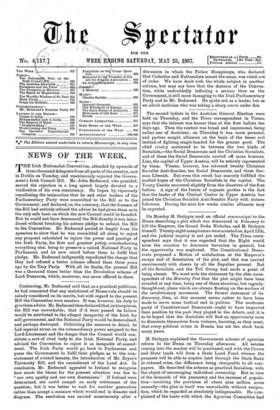Continuing, Mr. Redmond said that, as a practical politician, he
had consented that any instalment of Home-rule should be calmly considered on its merits, but with regard to the present Bill the Convention were masters. It was, however, his duty to give them advice. Mr. Redmond then declared that, in his opinion, the Bill was unworkable; that if it were passed its failure would be attributed to the alleged incapacity of the Irish for self-government, and the National Party would be demoralised, and.perhaps destroyed. Criticising the measure in detail, be laid especial stress on the extraordinary power assigned to the Lord-Lieutenant and the danger that the Council would con- stitute a sort of rival body to the Irish National Party, and advised the Convention to reject it as incapable of amend- ment. The Irish Party would go back to Parliament and press the Government to fulfil their pledges as to the rein- statement of evicted tenants, the introduction of Mr. Bryce's University Bill, and the amendment of the Land Act. In conclusion, Mr. Redmond appealed to Ireland to recognise how much the blame for the present situation was due to " our own apathy and our own dissensions." If Ireland were determined, she could compel an early settlement of the question ; but it was better to wait for another generation rather than accept a measure which would end in disaster and disgrace. The resolution was carried unanimously after a discussion in which the Father Humphreys, who declared that Catholics and Nationalists meant the same, was ruled out of order. We have dealt with the whole subject in another column, but may say here that the decision of the Conven- tion, while undoubtedly inflicting a serious blow on the Government, is still more damaging to the Irish Parliamentary Party and to Mr. Redmond. He spoke not as a leader, but as an adroit tactician who was taking a sharp curve under fire.


































